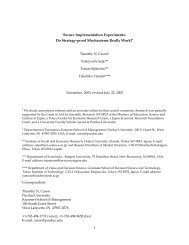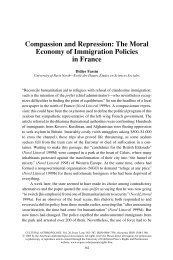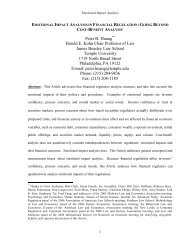Governance, Growth, and Development Decision-making - School of ...
Governance, Growth, and Development Decision-making - School of ...
Governance, Growth, and Development Decision-making - School of ...
You also want an ePaper? Increase the reach of your titles
YUMPU automatically turns print PDFs into web optimized ePapers that Google loves.
can be sustained when powerful groups in the polity find it in their<br />
interests to support political parties.<br />
The transition is about institutionalizing open access via<br />
impersonal relationships, not about adopting specific institutional<br />
forms, such as a bill <strong>of</strong> rights or the universal franchise. Institutions<br />
matter because they structure the incentives <strong>and</strong> constraints facing<br />
individuals. But as we have demonstrated, the same institutional<br />
forms work differently in different circumstances, particularly in the<br />
absence or presence <strong>of</strong> open access. Elections <strong>and</strong> corporations, for<br />
example, work differently in natural states than the same institutions<br />
work in open access orders.<br />
This way <strong>of</strong> thinking about the transition process results in<br />
a new interpretation <strong>of</strong> the economic <strong>and</strong> political history <strong>of</strong> the<br />
birth <strong>of</strong> modern open access societies at the end <strong>of</strong> the 18th <strong>and</strong> the<br />
beginning <strong>of</strong> the 19th century. Our economic history emphasizes<br />
the concern about the development <strong>of</strong> powerful new forms <strong>of</strong> elite<br />
economic organizations <strong>and</strong> the ‘corrupting’ effect <strong>of</strong> these organizations<br />
on politics that led to the acceptance <strong>of</strong> open access in the<br />
mid-19th century. Our political history emphasizes modifications<br />
to natural state institutions in the 18th century that led to concern<br />
within the elite that political competition would inevitably lead to<br />
consolidated political control by a faction who maintained control<br />
through manipulation <strong>of</strong> the economy. Ultimately, elites moved<br />
to protect their rights through institutions that guaranteed open<br />
economic <strong>and</strong> political competition by allowing the formation <strong>of</strong><br />
economic <strong>and</strong> political organizations at will, something the world<br />
had never seen before. The transforming effects <strong>of</strong> open access in<br />
the mid-19th century are manifest in the political <strong>and</strong> economic<br />
developments <strong>of</strong> the late 19th century <strong>and</strong> 20th century, including<br />
fostering more favorable circumstances for technological progress.<br />
The historical details <strong>and</strong> specific institutional mechanisms that<br />
developed in each specific society were critically important in that<br />
society, but neither the specific details nor the specific institutions<br />
were the same across societies. The transition was secured in the<br />
middle <strong>of</strong> the 19th century by institutionalizing open access—by<br />
Douglass North, John Wallis, <strong>and</strong> Barry Weingast 13
















